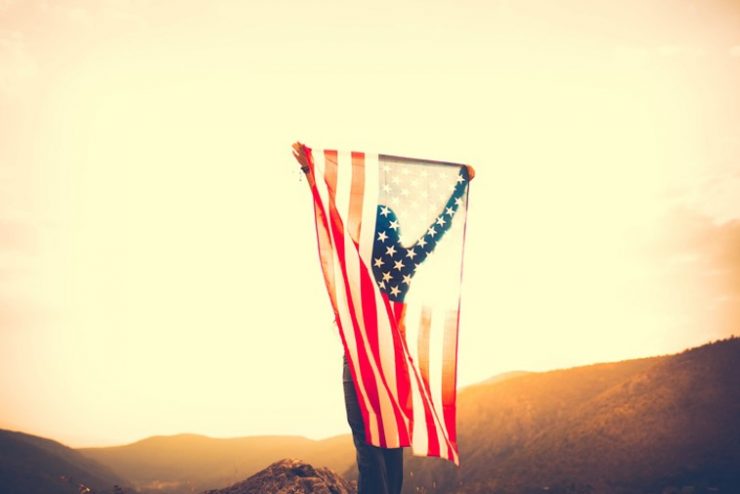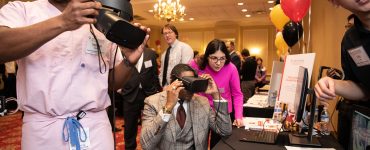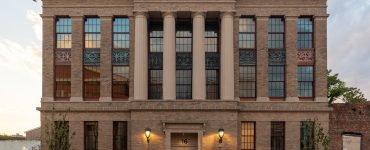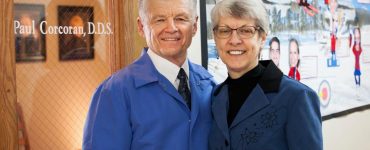A transformational gift to Maryland Carey Law promises to improve the lives of immigrants in Maryland and beyond.
“When we come together, we find a way to make the world a little bit better.”
This sentiment from Marco Chacón echoes the mission of the University of Maryland, Baltimore (UMB), its six professional schools and interdisciplinary Graduate School, and the many programs and initiatives run by its faculty, staff, and students. Marco and his wife Debbie know this firsthand through decades of partnership with UMB.
It also is the message they wish to share about the immigrant community and is the reason they’ve made a transformational $5 million gift to the University of Maryland Francis King Carey School of Law’s Immigration Clinic, which has been fighting to meet the legal needs of immigrants for more than 20 years.

Thanks to this investment from the Chacóns, the clinic has a lasting and bright future, and in recognition of this outstanding level of support, the law school is creating the Chacón Center for Immigrant Justice. The center will work toward a future where all Maryland families and residents are stable and secure regardless of immigration status, race or economics, and where the color of people’s skin or place of birth does not limit their opportunities to build a good life for themselves and their families. With secured funding, the center can increase the number of immigrants who obtain representation and relief, the impact of those cases, and the number of graduates it prepares to enter the workforce to continue this critical work.
“This extraordinary gift will guarantee that the voice of Maryland’s immigrants will be heard and protected far into the future and allow us to focus on building a just society by training future generations of advocates,” said Maryland Carey Law professor Maureen Sweeney, JD, director of the Chacón Center.
From Immigrant to Entrepreneur
The issue of immigration hits home for Marco, who came to the United States as an exchange student from Costa Rica and was embraced by a community of people and offered the opportunity to discover, understand, and experience a new way of life. He returned to the United States in the 1970s and married Debbie. The couple had two children and moved to Baltimore while Marco pursued his PhD in Nutritional Sciences from the University of Maryland, College Park.
He jokes that he entered a lab at 18 and never left, but through those decades of hard work, his unique perspective, and the support of his family and mentors, Marco became a successful biotechnology entrepreneur. In 2009, the Chacóns moved the company they founded, Paragon, to the University of Maryland BioPark, and it quickly grew to become the largest company there, employing hundreds and collaborating extensively with UMB. By 2019, Paragon had become a leading viral vector development and manufacturing partner for gene therapies and was acquired by Catalent, a diversified global provider of advanced delivery technologies and development solutions for drugs, biologics, and consumer health products.
While Marco’s success story is extraordinary, he wants people to know that it is not unique. Immigrants from all over the world come to the United States seeking opportunities and bring diverse expertise, unique insights, and a dedication to excellence that has become the backbone of the United States. Immigrants work in the labs of the biotech industry, toil from dawn to dusk in fields and food processing plants, heal our sick, educate the next generation of thinkers, invent and investigate tools for our future, are loyal companions to our elders, and protect our children. However, there are many immigrants who still struggle to access basic rights, especially in a complex and often-unfriendly legal system.
Immigrant communities are subjected to a harsh double standard in court, often not receiving competent legal representation or the same benefits afforded to white citizens. The Maryland Carey Law clinic’s student-attorneys provide compassionate and competent representation to their clients, winning asylum cases, allowing permanent residents to remain in the United States with their families, and helping noncitizens entangled in the criminal justice system avoid deportation. Clinic clients come from every continent, though in recent years an increasing number of people have been fleeing violence and instability in Central America.
In recent years, the needs and contributions of the immigrant members in our community have awakened an interest in the next generation of legal warriors. As demand for the clinic’s services increased, funding remained stagnant and the future of the clinic’s operations fell into jeopardy, but the Chacóns’ investment has changed its course.
‘Your Gift Brought Me to Tears’
Led by Sweeney and Gabriela Kahrl, JD ’08, the Immigration Clinic provides more than 7,000 hours of free legal services every year through a combination of direct representation and impact litigation focusing on asylum and the intersection of criminal and immigration law, with special attention to the legally, ethically, and psychologically complex situations that straddle these disciplines. It is a highly sought-after experience for students, many of whom have gone on to work in immigration law in all its facets.

“Your gift brought me to tears because it was a tremendous affirmation of the humanity, dignity, and inherent value of our clients,” Kahrl said in response to the Chacóns’ generosity. “You honor their struggle. You honor their strength and courage. And this affirmation of their inherent value is, in my experience, very rarely bestowed.
“I cannot tell you how many times I have been sneered at, rebuked, and mocked when fighting for my clients’ dignity. I bore it because, as bad as I had it sometimes, my clients had it far, far worse, and I was determined to use the privilege I had to make a difference. Because of you, Maureen and I will be able to do more than I ever imagined or hoped for to fight for our clients, their families, and immigrants nationwide. I thank you for your faith in us, in our work, but most importantly, for the faith you show in the people we serve.”
This philanthropic support will build a model of legal education and advocacy that will serve as an example for other law schools to create similar centers addressing the injustices that immigrants face around the country. It will allow the law school to create a federal appellate clinic to impact legislation and change the legal landscape in the Fourth Circuit and beyond. It will fund student trips to remote immigrant detention centers so students can help some of the most vulnerable and forgotten immigrants. It will ensure that Maryland Carey Law’s immigration program attracts the best and brightest students, recruits and retains top-notch faculty and instructors, and provides an expanded experiential learning curriculum, all of which will have a transformational and lasting effect on justice for immigrants in Maryland and beyond.
“We are thrilled to support your quixotic spirit that now — armed with a louder voice — will continue to influence new generations of jurists to join the battle against the windmills of injustice and prejudice,” the Chacóns wrote in a letter to the new center’s leaders. “We have no doubt that your success will be a reaffirmation of the importance of immigration in the history of the republic and give credence to Woody Guthrie’s hymn for the ages that ‘This land was made for you and me.’ ”
Learn more about the Chacón Center for Immigrant Justice and how you can support the future of immigrant justice in Maryland and beyond.





